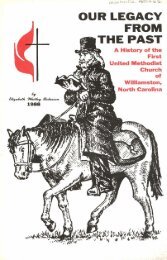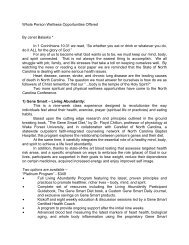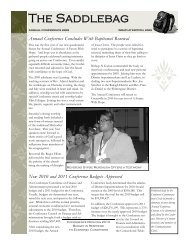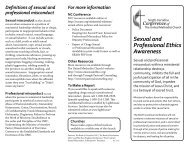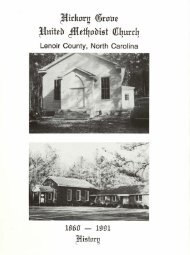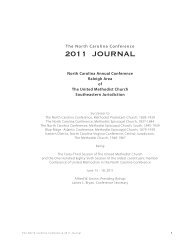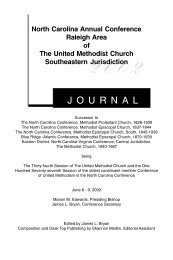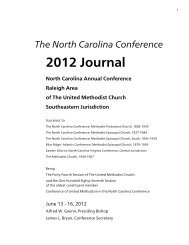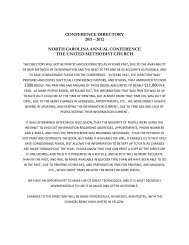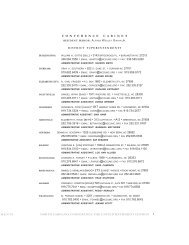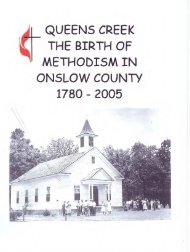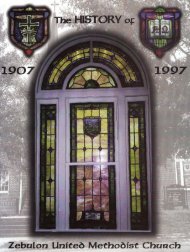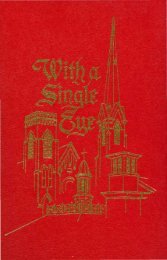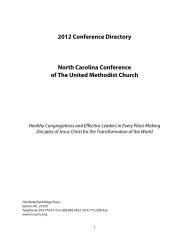Facing Tomorrow, Understanding Yesterday, A History of Orange ...
Facing Tomorrow, Understanding Yesterday, A History of Orange ...
Facing Tomorrow, Understanding Yesterday, A History of Orange ...
You also want an ePaper? Increase the reach of your titles
YUMPU automatically turns print PDFs into web optimized ePapers that Google loves.
One possible result <strong>of</strong> these meetings was a growing desire on the<br />
part<strong>of</strong> Methodists in Chapel Hill proper to organize their own church,<br />
whichthey did in the early 1840s.When Deems transferred from the New<br />
JerseyConference to the North Carolina Conference, he was assigned to<br />
theChapel Hill congregation, which was then meeting in a house on<br />
RosemaryStreet behind the present University Presbyterian Church. As<br />
thecongregation grew, it moved to the upper level <strong>of</strong> a store on Franklin<br />
Street.The first Chapel Hill Methodist Church was built at the northeast<br />
comer <strong>of</strong> Rosemary and Henderson streets. Dedication services occurredon<br />
July 3, 1853. 10<br />
TheMethodistchurches in the area were quite small atthe beginning<br />
and<strong>of</strong>tenwere joined together in a circuit that was served by one minister.<br />
Althoughthe records relating to <strong>Orange</strong> Church are not complete, what<br />
wedo know indicates that it was joined to a variety <strong>of</strong> neighboring<br />
congregationsover the years. Early church records did not list the names<br />
<strong>of</strong>the churches that pastors were assigned to until 1926, but church<br />
historiansare fairly sure that R.C. Maynard, who was assigned to <strong>Orange</strong><br />
Churchin 1840, had to serve at least the Mount Pleasant and <strong>Orange</strong><br />
churches.In 1899, Jacob H. McCracken's assignment included Duke's<br />
Chapel,Massey's Chapel, McMannens, Mount Bethel, Mount Sylvan,<br />
PleasantGreen, <strong>Orange</strong> Factory, <strong>Orange</strong>, and Fletcher's Chapel MethodistChurches.<br />
With such assignments, preachers were primarily circuit<br />
riderswhoreached churches irregularly. Perhaps there would be <strong>of</strong>ficial<br />
worshipservices conducted by an ordained minister on Sunday and<br />
perhapsnot. At times parishioners could count on having services led by<br />
theminister only once or twice a month. Sometimes the services would<br />
beinthe morning, sometimes in the afternoon. If the assigned minister<br />
couldnot reach the congregation for Sunday morning services, the<br />
congregationcarried on as best it could without him.<br />
Since these early circuit riders had to travel long distances on<br />
horsebackover unpaved and difficult roads in order to reach the churches<br />
ontheircircuit, other people stepped forward to provide spiritual nourishmentforthe<br />
congregation. William (Uncle Billie) ]. Duke (1803-1883),<br />
fromthe Bahama community near Durham, was one <strong>of</strong> these special<br />
people.<br />
Althoughhe was not an ordained minister, Uncle Billie called himself<br />
an"exhorter"and was much in demand by area churches without regular<br />
pastors.Among the congregations making regular use <strong>of</strong> his services<br />
were<strong>Orange</strong> Church, Massey's Chapel, Pleasant Green, Mount Hebron,<br />
andFletcher's Chapel. Residents recalled that Duke "used to be a faithful<br />
attendantat all <strong>of</strong> the revival services at Pleasant Green. He would come<br />
tothechurch immaculately clothed in a white linen 'duster', and when his<br />
wearingapparel became soiled, he left the services, mounted his horse,<br />
androdeawayin a cloud <strong>of</strong> dust. "11Uncle Billie ran a large farm during the<br />
weekand <strong>of</strong>ten preached several times each Sunday. According to tales<br />
<strong>of</strong>UncleBilliethat have passed down through the generations, "he could<br />
outpreachanybody in <strong>Orange</strong> County." In addition, members <strong>of</strong> his<br />
audiencefervently testified that Uncle Billie "knew the Lord, and he<br />
believedin letting everyone know it."12<br />
To a certain degree, this lack <strong>of</strong> a full-time minister hindered the<br />
growth<strong>of</strong><strong>Orange</strong> Church, butin another way, it helped build the devotion<br />
tothechurch that members have long held and increased the willingness<br />
<strong>of</strong>church members to take on all sorts <strong>of</strong> assignments.<br />
Asthe influence <strong>of</strong> <strong>Orange</strong> Church continued to grow in the community,its<br />
impact on its members increased as well. The first half <strong>of</strong> the<br />
nineteenthcentury, for instance, saw the first <strong>Orange</strong> Church member<br />
enter the ministry as a result <strong>of</strong> his religious experiences. Alexander<br />
Gattis,Jr.,(1818-1859),13son <strong>of</strong>Alexander Gattis, Sr., the donor<strong>of</strong>the land<br />
FACING TOMORROW, UNDERSTANDING YESTERDAY 9<br />
j ..,<br />
h<br />
•<br />
~/-.<br />
--".~<br />
\<br />
,



